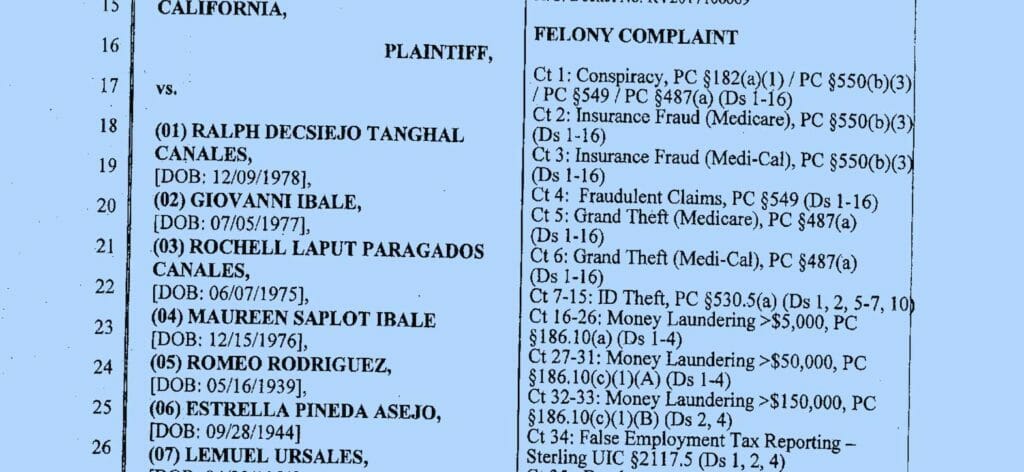Several Filipinos arrested in alleged $4.2 million hospice care fraud

RANCHO CUCAMONGA – California Attorney General Rob Bonta announced the arrests of 14 individuals in connection with two hospice companies accused of stealing more than $4.2 million from the federal Medicare and state Medi-Cal programs.
San Bernardino County-based New Hope Hospice, Inc. and Sterling Hospice Care, Inc. operated by Filipinos allegedly enrolled patients who were not terminally ill into hospice care. Sixteen people were charged in San Bernardino County Superior Court. Two defendants remain at large.
Many enrollees told investigators that they were enrolled without their knowledge or understanding of what hospice was.
All of the 14 arrested defendants face multiple felony counts including conspiracy to commit insurance fraud, insurance fraud, grand theft, and fraudulent insurance claims, with some defendants also facing charges related to identity theft, money laundering, and tax evasion.

Partial screenshot of California Atty. General’s complaint against hospice fraud defendants. Criminal charges must be proven in a court of law. Every defendant is presumed innocent unless or until proven guilty.
Criminal charges must be proven in a court of law. Every defendant is presumed innocent unless or until proven guilty.
“End-of-life care is a difficult process for families to endure, and patients should be able to trust that their hospice providers are acting in good faith,” said Attorney General Bonta. “My office is committed to protecting the well-being of Californians and prosecuting those who abuse the financial integrity of our health care system.”
The defendants allegedly billed Medicare and Medi-Cal for millions of dollars, fraudulently claiming that they were providing hospice care to patients who had less than six months to live when in fact these patients were not terminally ill.
Each of the defendants allegedly played a role in the scam. They allegedly paid illegal kickbacks to recruit patients for hospice care, including those who did not qualify for hospice because they were not terminally ill.
Defendants also allegedly took patient identity information to put them in hospice without their knowledge. They also falsely represented to patients what services they would be receiving and billed patients with one company but switch them to the other company to avoid detection.
When a patient is enrolled in hospice care, they give up their opportunity under the Medicare and Medi-Cal programs to receive medical treatment to prolong their life, such as chemotherapy for cancer patients.
Several ineligible patients incorrectly certified as terminally ill and tricked into receiving hospice services could have difficulty getting potentially lifesaving medical care in the event that any of them required it.
The case was investigated by the California Department of Justice’s Division of Medi-Cal Fraud and Elder Abuse (DMFEA). To learn more about DMFEA or to report Medi-Care fraud or elder abuse visit oag.ca.gov/dmfea. A copy of the complaint is available here.

